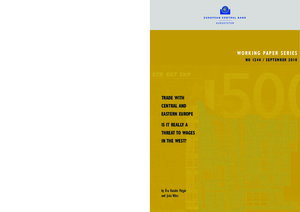Trade with Central and Eastern Europe. Is it really a threat to wages in the west?
"This paper analyses the relationship between openness to trade and wages at the industry level (15 manufacturing industries) in 25 EU countries over the period from 1995 to 2005. By applying a cross-country and industry-specific approach, it is possible to control for unobserved heterogeneity...
| Main Authors: | , |
|---|---|
| Institution: | ETUI-European Trade Union Institute |
| Format: | TEXT |
| Language: | English |
| Published: |
Frankfurt am Main
2010
ECB |
| Subjects: | |
| Online Access: | https://www.labourline.org/KENTIKA-19184987124919021699-Trade-with-Central-and-eastern.htm |
| Summary: | "This paper analyses the relationship between openness to trade and wages at the industry level (15 manufacturing industries) in 25 EU countries over the period from 1995 to 2005. By applying a cross-country and industry-specific approach, it is possible to control for unobserved heterogeneity at both country and industry levels. We also differentiate between intra and inter-industry trade as well as between trade from western and eastern Europe and we try to assess the relative importance of foreign wages versus domestic productivity developments in an open environment. We find that trade is not an important driver of wages, since the wage response to trade is small. Moreover, in line with the Stolper-Samuelson reasoning, imports from the west generally benefit wages in central and eastern Europe, while imports from the east rather tend to harm wages in the west. The overall wage response is still negative in some sectors, particularly in more resource-based industries. Nevertheless, increased trade reinforces the productivity-wage link and weakens the co-movement of wages particularly in the west, while at the industry level there is little evidence of such a wage-disciplining effect of trade." |
|---|---|
| Physical Description: | 47 p. Digital |

